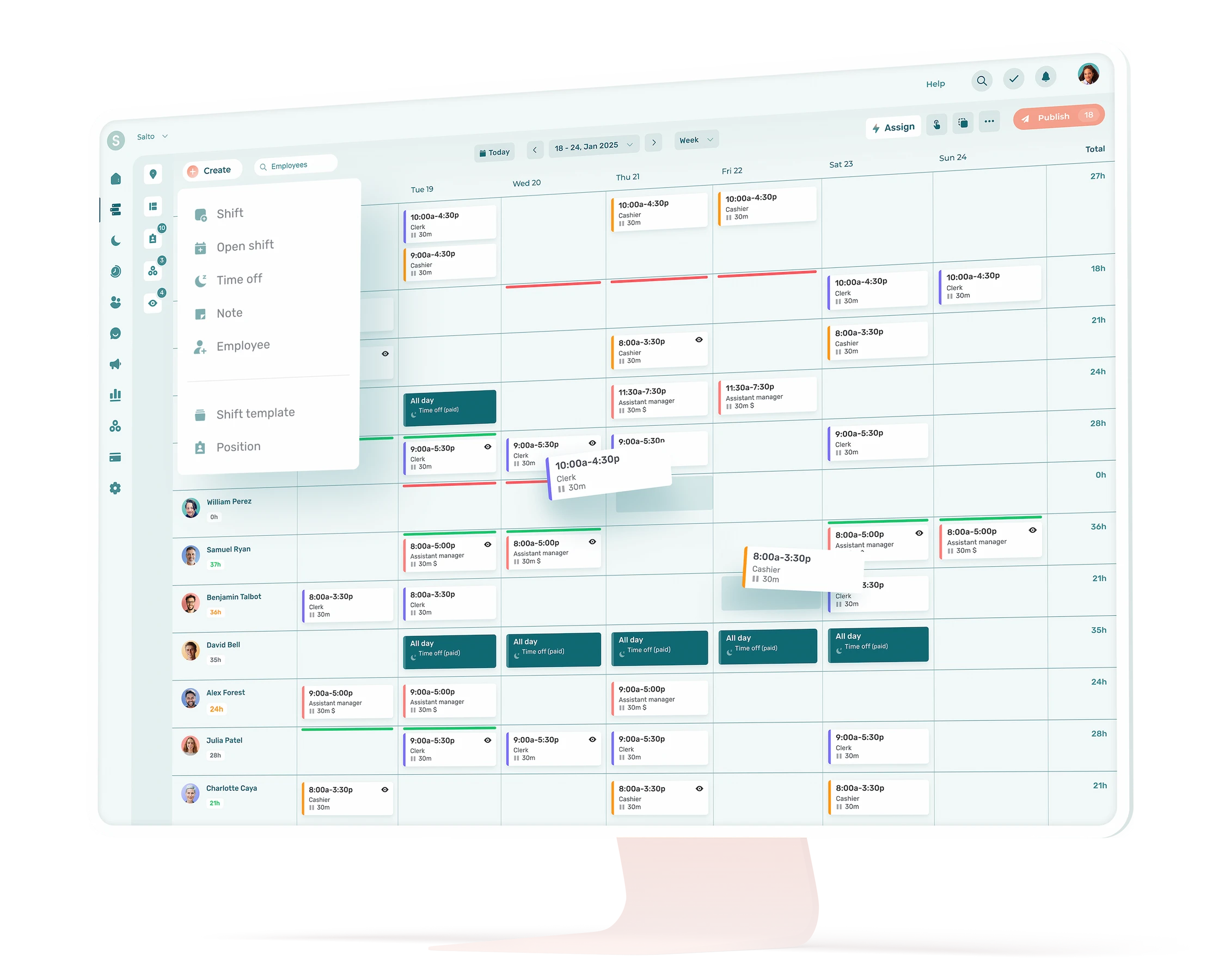Struggling with staff recruitment? Leverage your employees by offering them referral bonuses—after all, they are your best ambassadors!
Recruiting staff is no easy task these days. The Canadian unemployment rate is the lowest it has been in years, making recruitment more difficult and retaining staff more vital.
Your employer brand might be supremely attractive, but ultimately, what keeps team members at your company is your everyday actions as an employer. Your employees are in the best position to promote your company and your working conditions—they are the ones who live the employee experience at your organization day in, day out.
In addition to being ambassadors for your company, your employees have everything to gain by encouraging people in their networks to join their work team. So why not make it a more attractive proposition for employees to promote your open positions?
Hiring acquaintances of your employees positively impacts team members’ motivation, as it makes work more enjoyable for them. Not to mention that it can give your retention rates a boost.
This is why referral bonuses, also known as sign-on bonuses or employee referral programs, are a great addition to your recruitment strategy. In this post, I’ll introduce the principle of referral bonuses and 5 benefits of implementing them at your company.
What Is a Referral Bonus?
A referral bonus is financial compensation given to an employee who has referred an applicant who ends up being hired by the employer. The bonus is typically paid once the new employee’s hiring is finalized.
It is often given to the referring employee in two instalments. The first amount is paid at the time of hiring, and the balance three or six months later, once the new employee has completed their probation.
💡 Companies that use employee referral programs as a recruitment strategy usually have a clear policy in place. Among other things, such a policy should cover the terms and conditions, the amounts awarded, the timeline, the rules and any other relevant information.
Concrete Example of a Referral Bonus
Mary, a college student, has been working as a cashier at a pharmacy part-time for the past 2 years. She loves the job for its flexible schedule, which is adaptable to her courses and needs each semester.
Her manager is struggling to find staff to fill evening and weekend shifts, which are always the busiest times. He decides to offer a $200 referral bonus to employees who refer candidates hired for a cashier position.
In one of her classes, Mary chats with a friend, Justin, who is new to the area and looking for a part-time job. She tells him about her working conditions at the pharmacy and recommends the job to Justin, who applies.
When Justin is hired, Mary receives the referral bonus. In addition to being satisfied with this monetary bonus, she can now carpool with him when they’re working the same shift. In addition, she trains Justin and takes care of his onboarding—which in turn lightens her manager’s workload.
This demonstrates the positive impact a referral bonus can have even beyond recruitment itself, for both managers and employees.
‼️ Important: make sure not to confuse a referral bonus with a hiring bonus.
What’s the Difference Between a Referral Bonus and a Hiring Bonus?
A referral bonus is given to an employee who recommends a candidate to their employer. A hiring bonus is paid to the hired candidate when they start their job. An employer who offers a referral bonus will not necessarily offer a hiring bonus, and vice versa.
A hiring bonus is generally used to convince a potential employee to accept an offer instead of considering other offers. So it’s a different tactic from the referral bonus that you can add to your recruitment strategy, if it suits your needs and your business.
What Are the Benefits of Including a Referral Bonus in Your Recruitment Strategy?
Your employees are your company’s best ambassadors. An employee who is happy at work is sure to tell others about it.
Traditional posting is no longer enough to attract a pool of promising candidates. There are many benefits to implementing referral bonuses for your business. Here are a few:
1. Saving Time and Money
No matter how big or small, your company has limited human and financial resources. Every good manager has an interest in protecting them.
For a retail clerk, for example, employers must pay up to 16% of the annual salary to fill a single position. This comes out to a total of $5,324 for a full-time clerk earning $16/hour. That’s a lot of money!
And it takes time to wait for resumes and applications, many of which are not necessarily a good fit for the position you need to fill. Not to mention the cost of posting on specialized sites. Plus all the time spent analyzing everything. When you put all these expenses together, a referral bonus practically pays for itself. 💰
What’s more, you’ll attract candidates who already like your company given everything they’ve learned about it from your existing employees’ experience there.
2. Receiving More Quality Applications
It’s all about quality > quantity.
Some employers are reluctant to use a referral bonus for fear that employees won’t take it seriously and will refer whoever they want for a position. But I think these managers are mistaken.
It’s a safe bet that your employees will recommend qualified candidates who jibe with your company’s values and existing team members. Since they will then have to work together, it is to their advantage to recommend people they get along with.
3. Drumming up Motivation by Hiring Friends
Hiring friends is especially attractive for industries centred on customer service, such as restaurants, retail stores, seasonal employment and hospitality.
Among other things, it will make difficult times, such as busy periods or opening/closing shifts, more enjoyable. If your employees are having fun at work, your customer service is sure to benefit!
This is even easier to implement if your company employs several part-time people who are also still in school. They’re more likely to enjoy their work—resulting in higher team motivation and productivity.
4. Making Onboarding Easier
Starting a new job can be stressful, even for experienced candidates. Did you know that a robust, well-planned onboarding process can boost new employee retention rates by up to 40%?
Professional integration is often easier when an employee already knows someone who is working in-house. For example, they will feel more comfortable asking certain questions during their training and will already have a colleague to talk to during coffee breaks.
5. Improving Your Retention Rates
This benefit directly connects with point 3 and team motivation. If your employees are motivated and engaged, they will stay with you longer. They may even be willing to continue part-time during their post-secondary studies and full-time during their summer vacations.
You never know—they may even see themselves pursue a longer-term career if you offer them enticing skill development opportunities! 🚀
What Should a Referral Policy Include?
Before you jump in and announce that you want to offer referral bonuses to your employees, it’s best to establish your referral policy and communicate it to your team.
A few things to include in your referral policy:
- Clear objectives associated with your recruitment strategy
- Eligibility criteria for applications
- Which of your employees are eligible to receive a bonus if not all employees are eligible
- The process: how employees must tell their manager or HR responsible that they wish to recommend a candidate prior to their hiring (the bonus is not retroactive)
- The amount of bonuses and whether they vary according to the difficulty of the position to be filled (for example, a clerk vs. management position)
- Terms of payment for bonuses: for example, a one-time bonus at the time of hiring, or X amount upon hiring, then the remainder of the bonus 3 months later if the employee is still on the job
- The objectivity of your recruitment process: all applicants will be considered
💡 Remember to regularly remind your employees that you have a referral bonus program in place.
Your Employees Are Your Best Ambassadors
Referral bonuses are a great way to boost your recruitment efficiency while also increasing the engagement of your existing team. Why not kill two birds with one stone? Don’t forget, your employees are in the best position to “sell” your business.
Moreover, it’s much less likely that an employee will decide to leave their job when they’ve just recommended a friend who is going to be joining the company.
If you’re ever in doubt about the effectiveness of referral bonuses, remember that ultimately, you have the final say on who you hire. So, you have everything to gain by at least trying out this recruitment strategy!









